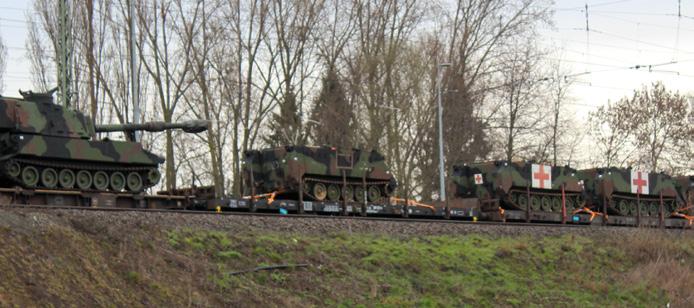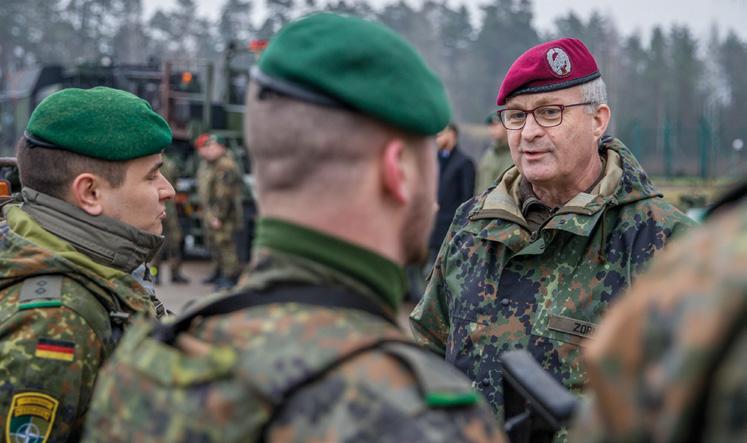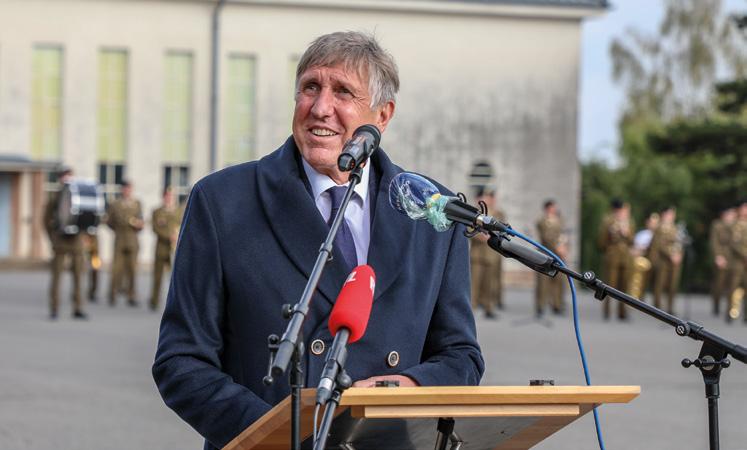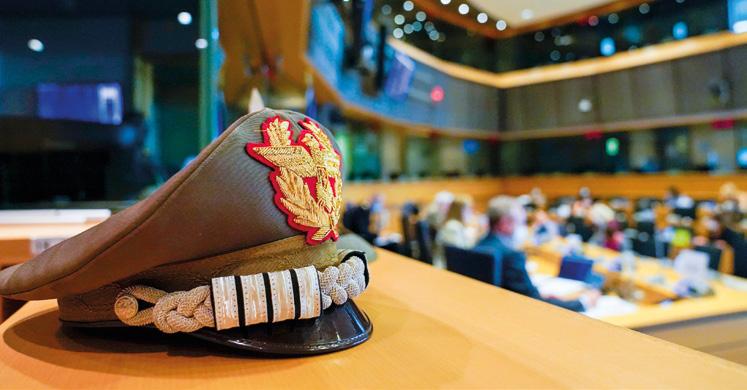
6 minute read
Arie Egozi, Tel Aviv stabilise the Middle East? Far away from peace in this region
Israel’s peace with Arab countries – a new chance to stabilise the Middle East?
by Arie Egozi, journalist, Tel Aviv
Aserious look at the Normalisation Agreements, also referred to as the “Abraham accords” signed on 15th September at the White House in Washington between Israel, the United Arab Emirates (UAE) and Bahrain, as well as later between Israel and Sudan, proves that after the celebrations end, some major problems still threaten the stabilisation of the Middle East.
Iran is the most serious threat for Israel
No doubt, Iran is rapidly developing a nuclear bomb to balance Israel’s alleged nuclear arsenal. Iran has no common border with Israel, but Syria and Lebanon are highly active proxies of Teheran, creating a major problem for Israel. Despite the Russian presence in Syria, Israel has not ceased its efforts to foil any results of the new Iran-Syria agreement that was signed in 2020 to allow Teheran to get a stronger foothold in Syria. A central component of the agreement is Syria’s Air Defence System (ADS) aiming at reducing Israeli, Turkish, and American freedom of action in Syrian airspace. This raises concern in Washington with the consequence that the US has increased its aerial patrols over Syria and Lebanon to counter Iranian activity. According to a report from Iran, Teheran will provide Syria with advanced Russian air defence systems, with some based on the S-300 and surface-air missiles like the one used by Iran to shoot down an American Hawk UAV in June 2019. According to Udi Dekel, a senior researcher at the Israeli Institute for National Security Studies (INSS), the agreement was signed as a possible withdrawal of US forces from Iraq and eastern Syria looks close. Dekel writes that according to assessments in Damascus and Tehran, such a development would probably allow increased Israeli air strikes along the Iraqi-Syrian border. “This is likely the reason for the need to reinforce Syrian aerial defence capabilities across the entire Syrian space, which currently is unable to intercept and thwart Israeli Air Force attacks against Iranian outposts in Syria”, he says. A recent incident involving Mehan Air, which is suspected of flying military equipment to the Hezbollah in Lebanon via Damascus, shows the increased tension in the area, where the US and Israel are watching “every small motion in the area”, as said an Israeli source. A few weeks ago, according to Teheran, several passengers on Mahan Air flight 1152 from Tehran to Beirut were injured after their passenger plane was forced to abruptly lower its altitude. The pilot claimed that this was because two American fighter jets dangerously approached his plane in the Syrian air space. A spokesman for the US Army
Central Command confirmed the incident but said that only
Arie Egozi
is the editor-in-chief of the Israel homeland security website (I-HLS). Born in Israel, he graduated from Tel-Aviv University in political science and jour-
Photo: private
nalism. He served in the Israel Defense Forces (IDF) and then worked as aerospace and defence correspondent for Israel’s largest daily newspaper “Yedioth Ahronot”, as well as for some foreign defence publications such as “Flight International and Aviation Week”.
one F-15 was involved – not two as Iran claimed. He said the pilot conducted a “routine visual inspection” of the Iranian plane as it passed over a base hosting American forces in the al-Than area of eastern Syria.
The Normalisation Agreement
While in the Syrian-Iranian arena things continue to boil, Israel signed the Normalisation Agreements in the presence of US President Trump with the two Arab countries UAE and Bahrain, and later with Sudan. A major objective of the agreements is to lower Iranian influence in the Gulf states, thus causing great concern in Teheran. The Foreign Ministry has strongly condemned the Normalisation Agreements between Israel and the Arab states, and even sent implicit threats against UAE leaders. An official statement said that the Islamic Republic of Iran condemns the UAE’s “shameful attempt” to normalise its relations with “the fake, illegal and inhumane Zionist regime”. The fact is that the UAE has the strongest and most effective military force in the Persian Gulf region, and other countries in the region are supported in their homeland security efforts by the US. In recent years, Sudan has served as a ‘pipeline’ for the transfer of Iranian-made weapons to the Hamas in Gaza. Foreign sources claimed that the Israeli air force attacked and destroyed some of these shipments. The signature of the agreement with Sudan surely intends to cut this pipeline. Turkey’s aspirations in the region could cause a dramatic change in the situation. Turkey has huge strategic interests in the Middle East and the Gulf region and is playing a multipronged game that serves Erdogan’s plans. At the same time Erdogan continues to violate the arms embargo on Libya by sending arms and mercenaries to support the Government of National Accord.
No progress in the Israel-Palestine relations
While the military-to-military relationship between Israel and the UAE is still limited to occasional intelligence sharing on specific issues, it is considered a big “celebration”. However, documentation
The Abraham Accords declaration
“We, the undersigned, recognize the importance of maintaining and strengthening peace in the Middle East and around the world based on mutual understanding and coexistence, as well as respect for human dignity and freedom, including religious freedom. We encourage efforts to promote interfaith and intercultural dialogue to advance a culture of peace among the three Abrahamic religions and all humanity. We believe that the best way to address challenges is through cooperation and dialogue and that developing friendly relations among States advances the interests of lasting peace in the Middle East and around the world. We seek tolerance and respect for every person in order to make this world a place where all can enjoy a life of dignity and hope, no matter their race, faith or ethnicity. We support science, art, medicine, and commerce to inspire humankind, maximize human potential and bring nations closer together. We seek to end radicalization and conflict to provide all children a better future. We pursue a vision of peace, security, and prosperity in the Middle East and around the world. In this spirit, we warmly welcome and are encouraged by the progress already made in establishing diplomatic relations between Israel and its neighbors in the region under the principles of the Abraham Accords. We are encouraged by the ongoing efforts to consolidate and expand such friendly relations based on shared interests and a shared commitment to a better future.”
Signed by US President Donald Trump, Minister of Foreign Affairs of Bahrain Dr. Abdullatif bin Rashid Al-Zayani, Israeli Prime Minister Benjamin Netanyahu and Minister of Foreign Affairs for the United Arab Emirates Abdullah bin Zayed Al Nahyanisigns, on 15th September 2020 at the White House.
one party was not included: Palestine, that is loudly condemning the Arab countries for having signed the agreement with Israel. Instead of taking advantage of the momentum, Palestine threatens to cut the defence cooperation with Israel in the West Bank. The Hamas in Gaza, supported by Teheran, continues to launch rockets into Israel and as retaliation, Israeli air force is bombing military facilities. So, while a new era has begun in the Middle East, many factors may affect it, either in the near future or at a later stage. We are far away from peace in this region.










